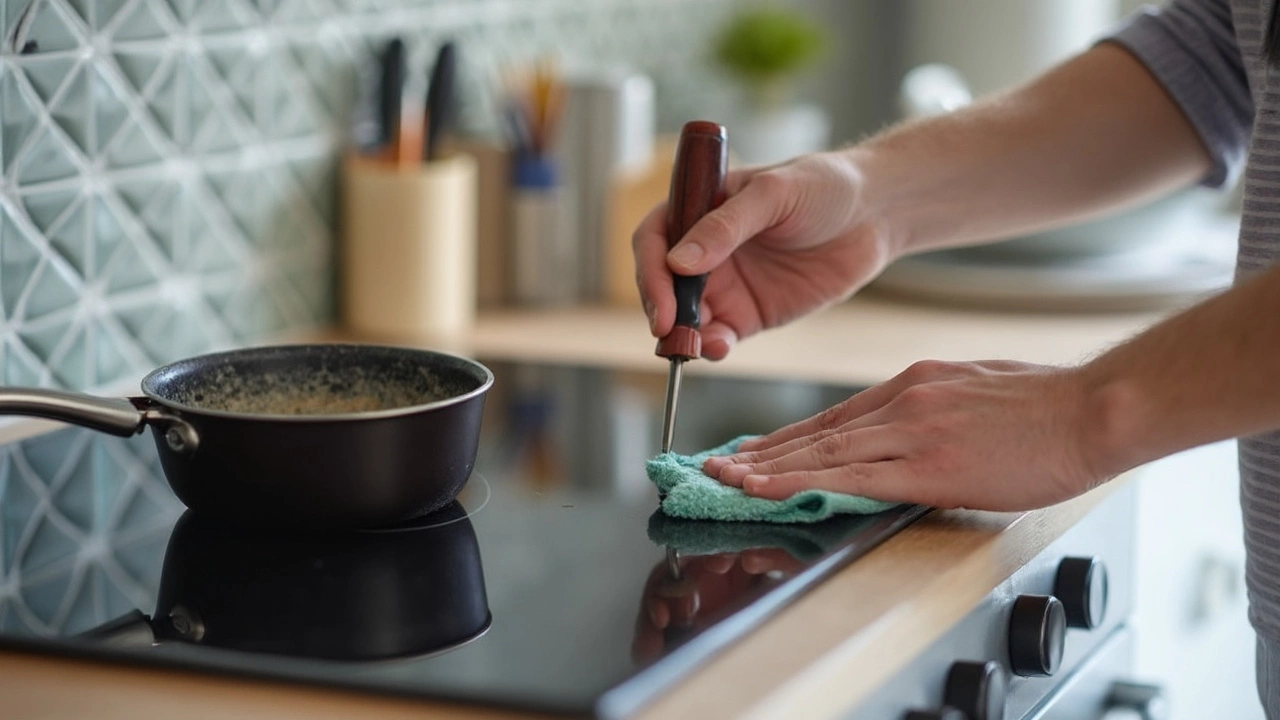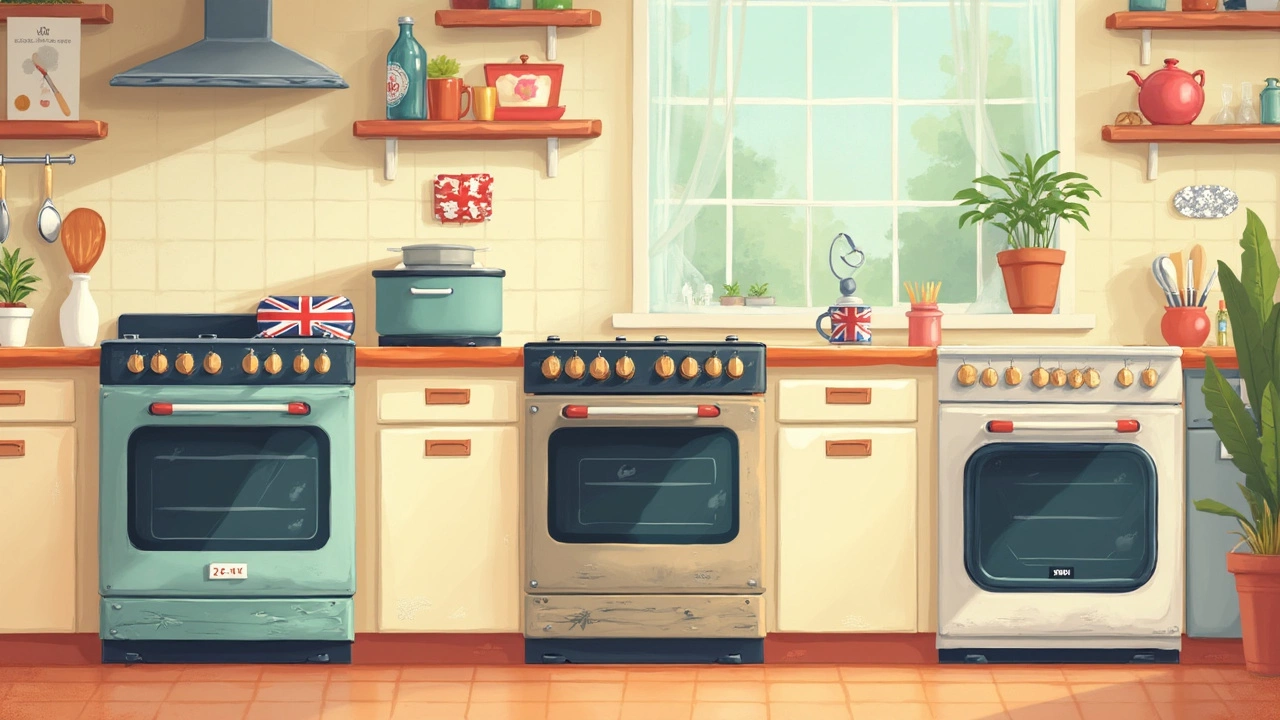Most people expect their electric stove to just keep going, year after year, without much thought. The truth is, these things aren’t invincible. On average, an electric stove should last about 13 to 15 years if you use it regularly and take care of it. Some folks manage to get nearly two decades out of theirs, while others run into trouble after 10 years if they’re cooking up a storm every night or skipping on cleaning.
If your stove’s not heating like it used to, or the burners are acting weird, that’s usually a sign things are wearing down. You might wonder, is it worth repairing, or should you start shopping for a new one? The answer depends on the kind of issues you’re dealing with and how old the stove is. Simple stuff like replacing a burner or fixing an oven thermostat can keep it working for years. But if you’re seeing the same problems pop up or repairs cost almost as much as a new model, it might be time to let go.
Ready to keep your appliance around as long as possible? Stick around for the easiest ways to maintain your stove and keep your kitchen running smoothly without wasting money on early replacements.
- Typical Lifespan of an Electric Stove
- Factors That Impact Longevity
- How to Extend Your Stove’s Life
- Common Problems and Quick Fixes
- When to Repair or Replace
Typical Lifespan of an Electric Stove
The average electric stove isn’t some short-lived gadget. Most major brands and industry groups put the expected run at about 13 to 15 years. If you’re using it as your main way to cook meals several times a week, that number holds up, according to appliance surveys from groups like the National Association of Home Builders.
Of course, this isn’t just some random guess. Builders and manufacturers often base this figure on actual service records and how often things like heating elements or oven controls fail. You’ll get the best mileage out of your electric stove lifespan if you keep up with cleaning and avoid slamming those oven doors or cranking the knobs too hard.
Some folks actually stretch their stove’s life out to 18 or even 20 years, but that usually takes a little luck and a lot of care. On the other hand, if you stick something like a foil sheet at the bottom of the oven or let spills bake on over and over, parts will wear out quicker. Simple routine maintenance really does make a difference.
If you’re curious if a newer stove will last longer, don’t count on it. Older models—especially those big clunky ones from the ‘90s—sometimes outlast the fancy digital ones you buy today. The main difference? The more electronics and bells and whistles added, the more chances there are for something to break early.
So, when you’re thinking about stoves, expect at least a solid 13-15 years. If you’re lucky and take care of it, you’ll get even more, but don’t ignore those small signs of wear—they can make a big dent in the years your appliance sticks around.
Factors That Impact Longevity
The number one reason your electric stove sticks around—or calls it quits early—comes down to how you use and take care of it. Let’s break it down.
- Usage Habits: If you’re cooking every day, hours at a time, your stove is going to wear out quicker than someone who heats up leftovers once a week. Heavy use causes more cycles of heating and cooling, which stresses the components.
- Cleaning and Maintenance: Food spills and grease buildup aren’t just annoying; they can clog up burners and damage electric connections. People who wipe up messes quickly and clean drip pans regularly usually get a few more good years from their appliances.
- Quality of the Stove: Not all stoves are built the same. Entry level models from big box stores might not hold up as long as mid-range or high-end brands. When you buy, check if the model has metal knobs, good seals, and a solid warranty.
- Power Surges: Big spikes in your home electricity—caused by storms or old wiring—can fry important parts like control boards. Using a surge protector may help, especially if you live in an area with dodgy power.
- Repairs and Part Replacements: Swapping out a faulty heating element or a broken control knob is way cheaper than replacing the whole appliance. Timely repairs delay bigger problems and are easier on your wallet.
Check out this table. It shows how different habits and factors can affect the lifespan of your electric stove:
| Factor | Effect on Lifespan |
|---|---|
| Daily heavy cooking | Reduces by 2-5 years |
| Weekly cleaning | Adds 1-3 years |
| Ignoring minor repairs | Reduces by up to 3 years |
| Using surge protection | Adds up to 1 year |
| High-end brand | Can last 2+ years longer |
Taking these steps doesn’t just give your stove a longer life—it means fewer headaches and less cash spent on a new one. Want to see real difference? Treat your electric stove like an investment, not an afterthought.

How to Extend Your Stove’s Life
Want to keep your electric stove working past that 13-year mark? It’s easier than you might think. The trick is not just ignoring the little things until they turn into big problems. Basic maintenance and a few daily habits go a long way toward squeezing extra years out of your appliance.
The first rule: regular cleaning. When food spills or grease builds up, it can clog burner plates and cause heating elements to wear down faster. Wiping your stove and oven after every use keeps problems at bay and makes deep cleans way less of a hassle.
- Use a soft cloth or sponge with mild soap—skip the harsh chemicals and scouring pads, as they damage surfaces and burners.
- Check under the burners for crumbs or residue that can cause uneven heating or bad smells.
- Every couple of months, gently remove and clean the knobs, as grease around them affects controls.
Don’t skip your yearly check-up, either. At least once a year, give the stove a full inspection. Look for any loose wiring, corrosion, or signs of wear on the burners. A quick once-over can catch small stuff before it turns into a burned-out element or broken control panel.
Your cookware matters, too. Only use flat-bottomed pots and pans so the heating element gets proper contact. Warped pans make the stove work harder, which wears out the electronics faster. Keep pot and pan sizes matched to the burner—oversized pans cause slow, uneven cooking and overheating.
- Resist the urge to slam or drop heavy pans on the glass top—tiny cracks can eventually turn into big breaks.
- Don’t use the stove as extra counter space when it’s off. Heavy loads or spills can mess up the electronics inside.
Here’s a quick data snapshot on what usually happens when folks take care of their stoves versus when they don’t:
| Maintenance | Average Lifespan | Common Issues |
|---|---|---|
| Regular cleaning + checks | 15-18 years | Minor repairs, rarely burns out |
| No regular care | 8-10 years | Burnt elements, electronic failures |
| Poor cookware choices | 10-12 years | Surface cracks, bad heating |
One last thing—don’t ignore the manual. Every stove has its own quirks, and your manual has steps specific to your make and model. Taking five minutes to browse through it can save you from rookie mistakes. When you follow these tips and pay mind to electric stove lifespan, you’ll get more out of your appliance and avoid shelling out for a new one sooner than you planned.
Common Problems and Quick Fixes
Every electric stove runs into issues sooner or later. Some are just plain annoying, others can actually keep you from cooking dinner. Knowing what’s typical helps you spot the problem—and fix it—before things get worse. Here’s a look at what breaks most often and how you can get your stove back up and running fast.
| Problem | Likely Cause | Quick Fix |
|---|---|---|
| Burner won't heat | Burner element or socket is worn | Swap burner with another to test, replace if broken |
| Oven won’t reach set temp | Faulty temperature sensor or bake element | Test sensor with a multimeter, replace if faulty |
| Stove light stays on | Stuck switch under knob | Unplug range, tap or wiggle switch, replace if stuck |
| Burner only heats on high | Bad infinite switch | Replace switch on control panel |
| Digital display dead | Tripped breaker or bad control board | Check fuse box, reset breaker, replace board if needed |
The electric stove lifespan gets cut short by ignoring little problems. If a burner goes cold, don’t just use another—try swapping the non-working coil with a working one to see if it’s the element or socket. For ovens that never seem to hit the right temperature, grab a cheap oven thermometer to check if it’s actually running cold. If it is, sensors or heating elements are the usual suspects.
If the indicator light stays on even when everything is off, the switch inside the knob is probably stuck or failed. Unplug the stove, try giving the switch a gentle tap or wiggle. Still stuck? You might need a new switch, but it’s a simple DIY with a screwdriver and a little patience.
Got a burner that only blazes on high? That usually means a worn infinite switch—the part that controls how much juice goes to the element. Expect to spend less than $40 if you're handy with a screwdriver. Just make sure you unplug the stove first.
Sometimes the digital display goes blank. Before panicking, check your fuse box—one tripped breaker can shut the control panel down. If the breaker isn’t the issue, the electronic control board might need replacing, which costs more but still beats buying a new range for most folks.
- Always unplug your stove before doing any repair work.
- Keep basic tools around: screwdriver, multimeter, needle-nose pliers.
- Keep your model number handy. Replacement parts are usually easiest to find online with this info.
- Don’t force broken parts—if a burner won’t click into place, the socket’s probably bad.
Quick fixes buy you time and money, but if you’re always patching things up, your stove might just be past its prime. We'll talk more about when you should finally let it go in the next section.

When to Repair or Replace
If your electric stove is acting up, you’ll probably wonder whether to bother fixing it or just cut your losses and get a new one. It’s usually not a black-and-white decision, but there are some real signs and facts that can help you out.
Start with age. If your stove is under 8 years old, repairs usually make sense—parts are still easy to find, and most issues aren’t deal breakers. Hit the 10-to-15-year stretch, and repairs might become more of a gamble. According to appliance industry stats from the National Association of Home Builders, the average lifespan for electric ranges is about 13 years. Past that, you’re rolling the dice.
| Stove Age | Recommended Action |
|---|---|
| 0-8 years | Repair if parts are affordable |
| 9-13 years | Consider repair if cost is less than half of a new stove |
| 14+ years | Replacement is often better long-term |
Costs matter too. Here’s a good rule: if the repair will cost more than 50% of a brand-new stove, look for a replacement. Simple stuff like a knob or a burner coil is worth fixing, but if you hear words like “control board failure” or “oven wiring,” get ready for a big bill.
Pay attention to your daily experience. Are you calling the repair guy a lot or struggling with burners heating unevenly? Maybe your food takes forever to cook, no matter how many fixes you try. That’s your cue—it’s time to upgrade.
- If safety is a concern, like persistent electric shocks, sparking, or burning smells, stop using the unit and replace it ASAP.
- Consider energy costs. Newer electric stoves use less power, so your bills could drop with an upgrade.
- Think about available features. Modern stoves can make your kitchen life easier—touch controls, better ovens, easier cleaning, you name it.
The bottom line: If your stove is still in its prime and repairs are simple, it’s worth fixing. But if you’re stuck with repeat issues, high repair costs, and an aging appliance, putting your money into a new model saves you frustration in the long run. Pay extra attention if your home warranty covers repairs—a call to your provider could take care of everything.
So, don’t just go with your gut. Weigh the facts, watch your wallet, and keep your electric stove lifespan in mind. That way, you’ll know exactly when to call the repair pro—and when to go shopping for your next kitchen workhorse.


